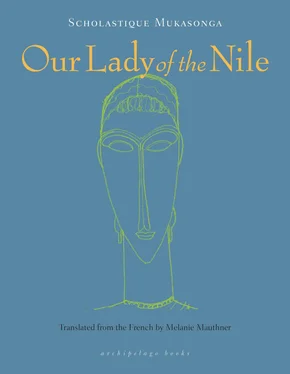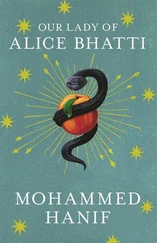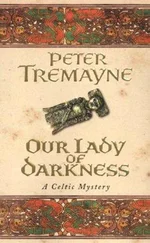“Well, it must be a girl,” Godelive said.
“Not at all, you saw very well from the front, it’s a man,” argued Frida.
“He’s a hippie,” Immaculée explained. “The young people in America are all like that now.”
Sister Gertrude ran to warn Mother Superior:
“ Mon Dieu ! The Frenchman, Mother, he’s here!”
“Well, what about the Frenchman? Show him in.”
“Oh, mon Dieu , Reverend Mother! The Frenchman, wait till you see him!”
Mother Superior had the greatest difficulty suppressing a gasp of horror when the new teacher entered her study.
“I’m Olivier Lapointe,” said the Frenchman nonchalantly. “I’ve been posted here. This is the lycée of Our Lady of the Nile, right?”
Stunned with indignation, Mother Superior was lost for words, and in order to gather her senses, she turned to Sister Gertrude:
“Sister Gertrude, please show Monsieur to his lodgings.”
Kanyarushatsi (Mr. Hair), as the girls called him, remained closeted in his bungalow for two weeks. They told him they were putting the finishing touches to the timetable. Nearly every day, a delegation sent by Mother Superior — Father Herménégilde, Sister Gertrude, Sister Lydwine, the Belgian teachers, the two other Frenchmen, and, finally, Mother Superior herself — attempted, on the pretext of a courtesy visit, to persuade him to get a haircut. Mr. Hair was prepared to cede on every other issue: wear a shirt and tie, and decent trousers. But when it came to his long hair, he was quite intransigent. They suggested he cut it to at least shoulder length. He refused point-blank. Never would he let a single hair be touched. His long locks were his one pride, the masterpiece of his youth, his whole reason for living, and he wouldn’t give it up for anything in the world.
Mother Superior bombarded the ministry with desperate letters. The French teacher’s shamefully long hair was a threat to every moral, both civic and Christian, and imperiled the future of Rwanda’s female elite. The Minister wrote an embarrassed letter to the French ambassador and his cultural Attaché, who returned to the lycée and threatened Mr. Hair. In vain. Despite the close surveillance placed on his bungalow, the lycée girls came and hovered around it. Whenever there was a sunny spell, he was often seen drying his long, golden curls outside after a shampoo. Some girls even dared to gesture and call to him from afar: “Kanyarushatsi! Kanyarushatsi!” The lycée staff eventually lost heart and allowed him into the classroom. They needed a math teacher. Yet the pupils were very disappointed with his performance. In class, he never budged from his equations. He was actually quite similar to Monsieur Van der Putten, except that when he turned around to write on the blackboard, the girls gazed, enraptured, at his long flowing mane. When Kanyarushatsi left the room at the end of class, the most shameless of the seniors swarmed about him and, under the pretext of asking him questions about elements they hadn’t understood, tried to touch his hair. He answered as quickly as he could, without daring to look at the cluster of insistent young women jostling him. He finally managed to extricate himself from this pack of purportedly curious girls, striding off down the hallway to escape them.
At the end of the year he was sent back to France. “We were mere tenth graders then,” said a regretful Immaculée, “but if he were still around, I’d know just how to tame him now.”
“They haven’t touched a thing, again,” bemoaned Sister Bénigne, assigned to the kitchen to help old Sister Kizito, whose hands trembled and who needed two canes to walk. “The dishes come back half eaten. Are they scared I’ll poison them? Do they take me for a poisoner? I’d really like to know who put that into their heads! Is it because I’m from Gisaka?”
“Don’t you worry now,” said Sister Kizito in a reassuring voice. “You’ll see, Gisaka or no Gisaka, this time next week their suitcases will be empty, and whether they like your cooking or not, they’ll be forced to eat it. They’ll lick the plates clean.”
Before returning their daughters to school, the girls’ mothers had indeed filled their suitcases with the most delectable food a Rwandan mother could imagine and prepare.
“They make them eat nothing but white people’s food at the lycée,” they’d say. “Unfit for Rwandans, especially young women — some say it could make them infertile.”
So suitcases became well-stocked pantries filled by doting mothers: beans and cassava paste, with a special sauce, in little enameled containers decorated with large flowers and wrapped in a piece of cloth; bananas slowly baked overnight; ibisheke , sugarcane you chew and chew until the pure fibrous marrow fills your mouth with its sweet juice; red gahungezi sweet potatoes; corncobs; peanuts; and even, for the city girls, doughnuts of every color under the sun — a secret Swahili recipe — avocados you can only buy at Kigali markets, and extra-salty, red-roasted peanuts.
At night, as soon as the monitor had left the dorm, the feast began. The suitcases were opened, and all the victuals laid out on the beds. One of the girls would check that the monitor was fast asleep, but some of the monitors, like Sister Rita, weren’t fools and were quite willing to be corrupted in order to join the banquet. An assessment was made of everyone’s provisions, and it was decided what should be eaten first, before the evening’s menu was planned. Any selfish, greedy girl who tried to keep a little of her pantry for herself, and deprive the communal banquet, was roundly condemned.
Alas! The supplies soon ran out, and after two or three weeks there was nothing left but a few handfuls of peanuts reserved for emergency consolation on really bad days. The girls would have to resign themselves to eating whatever was served in the refectory: tasteless bulgur; a yellow paste, with the sonorous name “polenta,” that stuck to the palate and that Father Angelo — a regular guest from the neighboring mission — wolfed down with relish; soft little oily fish out of cans; and sometimes, on Sundays and holidays, meat from who knows what sort of animal called corned beef …
“Everything the whites eat,” moaned Godelive, “comes out of cans, even the sliced mango and pineapple swimming in syrup, and the only real bananas they serve us are the sweet bananas at the end of the meal, but that’s not how you eat bananas. As soon as I get home for vacation, me and my mother will prepare real bananas. We’ll oversee the kitchen hand as he peels and cooks them, in water with tomatoes. Then my mother and I will add everything else: onions, palm oil, very mild irengarenga spinach, quite bitter isogi leaves, and small dried ndagala fish. It’ll be a real feast, with my mother and sisters.”
“You don’t know anything,” Gloriosa said. “What you need is peanut sauce, ikinyiga , and then cook slowly, really slowly, so that the sauce infuses right to the heart of the bananas.”
“But if you cook with Butane gas and a saucepan like they do in the city,” Modesta butted in, “the bananas will cook too fast, and they won’t be soft and creamy. You need to use a clay pot and charcoal. It takes a very long time. I’ll give you the real recipe, it’s my mother’s. First of all, you mustn’t peel the bananas. You put a little water in a big pot, then lay the bananas on top, nice and tight, and cover them with a thick layer of banana leaves; it must be airtight, so use leaves that aren’t torn. Then weigh them down with a shard of pottery. Now wait, a long time. It’s got to cook nice and slow, but if you’re patient you’ll get lovely white bananas, soft and creamy all the way through. And you have to eat them with some ikivuguto buttermilk, and invite your neighbors.”
Читать дальше












